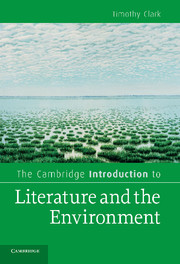Crossref Citations
This Book has been
cited by the following publications. This list is generated based on data provided by Crossref.
Zapf, Hubert
2012.
English and American Studies.
p.
253.
French, Jennifer L.
2012.
Voices in the Wilderness: Environment, Colonialism, and Coloniality in Latin American Literature.
Review: Literature and Arts of the Americas,
Vol. 45,
Issue. 2,
p.
157.
Samuelson, Meg
2012.
Crossing the Indian Ocean and wading through the littoral: Cosmopolitan visions in Amitav Ghosh’s ‘antique land’ and ‘tide country’.
Cultural Dynamics,
Vol. 24,
Issue. 2-3,
p.
189.
Chamberlain, Louise
2013.
Coming down like slate-grey rain: Barry MacSweeney's natural–artificial environments.
Green Letters,
Vol. 17,
Issue. 2,
p.
137.
Westling, Louise
2013.
The Cambridge Companion to Literature and the Environment.
p.
1.
Rigby, Kate
2013.
The Cambridge Companion to Literature and the Environment.
p.
212.
Marland, Pippa
2013.
Ecocriticism.
Literature Compass,
Vol. 10,
Issue. 11,
p.
846.
Craig, Bonnie M.
2013.
Rewriting American Identity in the Fiction and Memoirs of Isabel Allende.
p.
117.
Parashkevova, Vassilena
2013.
Annual Bibliography of Commonwealth Literature 2012.
The Journal of Commonwealth Literature,
Vol. 48,
Issue. 4,
p.
457.
Alves, Isabel Maria Fernandes
2013.
Gardens in the Dunes: Indigenismo, natureza e poder em perspetiva ecocrítica.
Revista Crítica de Ciências Sociais,
p.
213.
Goodbody, Axel
2013.
The Cambridge Companion to Literature and the Environment.
p.
61.
Thornber, Karen
2013.
East Asian Ecocriticisms.
p.
237.
Huang, Peter I-min
2013.
East Asian Ecocriticisms.
p.
125.
Lidström, Susanna
and
Garrard, Greg
2014.
“Images Adequate to Our Predicament”: Ecology, Environment and Ecopoetics.
Environmental Humanities,
Vol. 5,
Issue. 1,
p.
35.
Kim, Paul Chi Hun
2014.
Ecotheology and the Idea of Forgiveness in The Rime of the Ancient Mariner.
Literature Compass,
Vol. 11,
Issue. 2,
p.
107.
Rauscher, Judith
2014.
On Common Ground: Translocal Attachments and Transethnic Affiliations in Agha Shahid Ali’s and Arthur Sze’s Poetry of the American Southwest.
European journal of American studies,
Vol. 9,
Issue. 3,
Maran, Timo
2014.
Biosemiotic criticism: modelling the environment in literature.
Green Letters,
Vol. 18,
Issue. 3,
p.
297.
Grogan, Bridget
2014.
Homo ferus: the unification of the human and the environmental in David Malouf'sAn imaginary life.
Scrutiny2,
Vol. 19,
Issue. 2,
p.
18.
Callaway, Elizabeth
2014.
A Space for Justice: Messianic Time in the Graphs of Climate Change.
Environmental Humanities,
Vol. 5,
Issue. 1,
p.
13.
Giles, Jana María
2014.
Can the Sublime Be Postcolonial? Aesthetics, Politics, and Environment in Amitav Ghosh’sThe Hungry Tide.
Cambridge Journal of Postcolonial Literary Inquiry,
Vol. 1,
Issue. 2,
p.
223.



